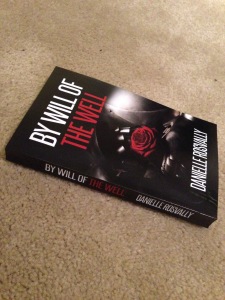It’s kind of a running tradition that every year for my beloved’s birthday, I come up with some hand-made way to express how joyful it makes me that he was born. One year, I made him one of these little babies (that was a huge hit, by the way, and not horribly difficult to make). Another year, I took a box of his favorite tea and wrapped each tea bag with a slip of paper that had a reason why he’s awesome on it and a sentiment of endearment.
This year I wrote him a book.
It sounds pretty extreme when you put it that way, but think of this: every person in the world needs a creative outlet. I love to write. At this stage of my dissertation process, I do a LOT more research than writing, and creative writing is an entirely different beast than academic writing. I needed a place to put all of the pent-up writer’s emotion that wasn’t going into my diss. That, and I wanted to play with the novel-writing functions/capabilities of Scrivener (which, when I started writing this book, was a new toy for me).
You might also say “where on earth did you, oh woman who works seven jobs, find the time to do a thing like write a novel!?”. The truth is that it happened in snatches. I set myself word targets and sat down to write one chapter a night (two when I was being REALLY productive). I took breaks when it got too overwhelming, and I definitely didn’t edit it as toughly as I could have. On the whole, it did eat into my social time; but not as much as you might think. Part of it was discipline; I knew that I had to write at a certain pace in order to hit my goal; so I just did. Part of it was careful outlining; I came up with the story I wanted to tell in about five minutes as I was going to sleep one night. Then I took that outline and pulled it apart into chapters so that I always knew exactly where I was going with things at any given time. This helped when I got stuck in the occasional rut because I could tell myself “you’re not stuck; you know exactly where you need to be… just knuckle under and write!”
The point of the exercise was simple: to write my companion a story that he would enjoy reading, and that I would enjoy producing. And to play with my new toy software (which, by the way, is still awesome and I highly recommend to anyone producing any writing of any length but particularly long pieces or things that require a lot of moving parts to keep going).
But I had an ulterior motive as well. I wanted to prove to myself that I could, on a time-table, produce a novel-length manuscript that was worth the paper it was printed on. It was a test, you see. A way to prove to myself that I was in fact capable of producing that many words and slapping them coherently on the page. And you know what? I am. I know I am because I did. And that’s just one less piece of ammo that my demons can use against me when I’m having bad dissertation-writing days.

Yup. There she is. My book. That I wrote. And had professionally printed. Because I can write books.
I had the book printed on Harvard’s Espresso book machine (her name is Paige Gutenberg, by the way). It was an awesome experience to layout my own text (so not as hard as it may seem; the final product even has fancy drop-caps at the beginning of every chapter, different alternate page numbering, and header texts which varies by chapter and is distinct on odd and even pages), PDF everything, send it, proof it, re-edit, then send again. The nice lady who runs the Espresso book press even agreed to meet me at a time when we could watch her print the final product so that we could see the machine in action. It’s totally awesome to think that we live in a future where I can manipulate a few lights and dots on a computer screen, then have that create an object of importance with which one can interact about fifteen minutes later.
So take that, dissertation demons. I wrote a book. And I’ll write another one, too. As soon as I get all of my research ducks in a row. Ugh. Guess I better go read something now…













 The TA’s office hours can be extremely helpful if you find yourself struggling with your writing, understanding an assignment, understanding the course material, or even the college experience in general. Think of the TA like a friendly neighborhood spiderman: the TA is closer to the undergraduate experience and so is more likely to remember what it’s like, the TA knows the library resources really well because she spends her days digging through them, the TA is excited about whatever it is that you’re studying and would love an opportunity to pass on some wisdom, knowledge, or advice, and the TA works closely with your professor and so knows what is expected of you/the class in general.
The TA’s office hours can be extremely helpful if you find yourself struggling with your writing, understanding an assignment, understanding the course material, or even the college experience in general. Think of the TA like a friendly neighborhood spiderman: the TA is closer to the undergraduate experience and so is more likely to remember what it’s like, the TA knows the library resources really well because she spends her days digging through them, the TA is excited about whatever it is that you’re studying and would love an opportunity to pass on some wisdom, knowledge, or advice, and the TA works closely with your professor and so knows what is expected of you/the class in general.